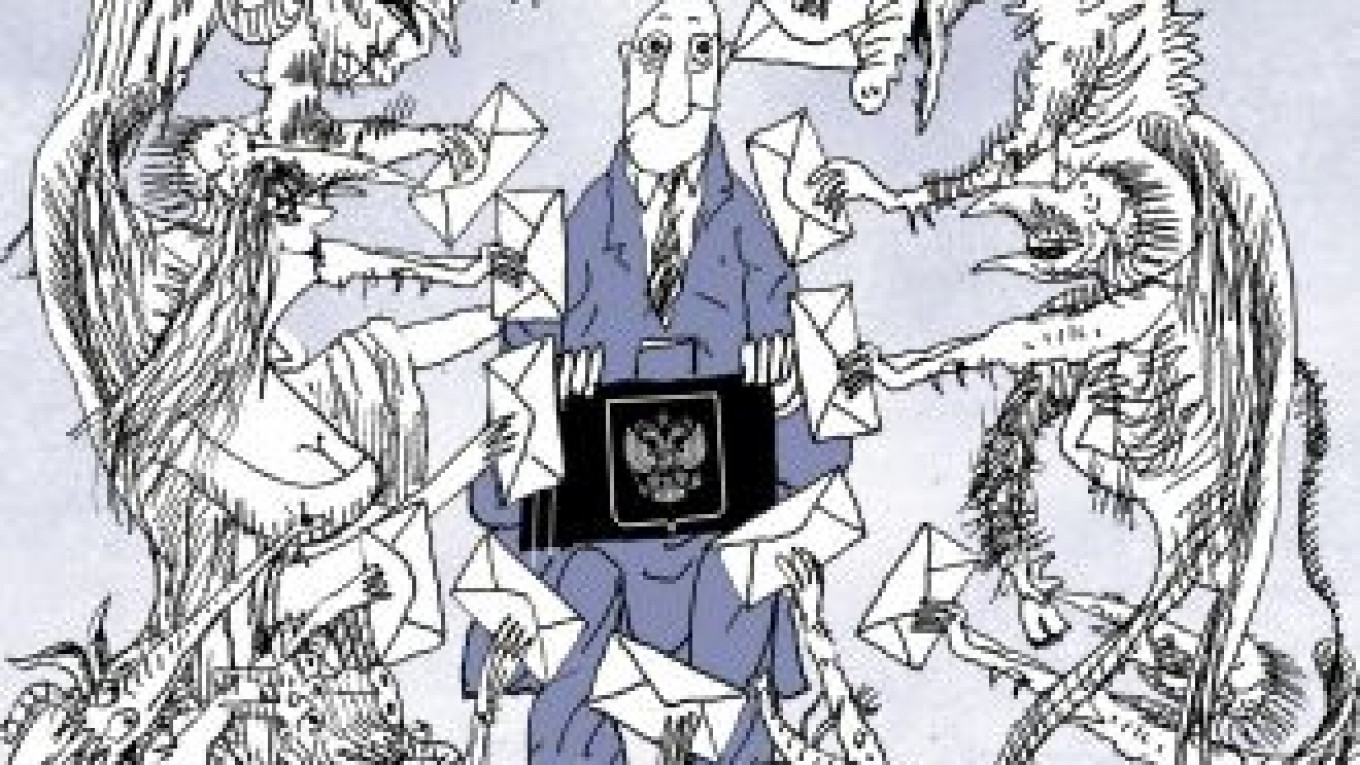What was singer Andrei Makarevich expecting when he wrote a letter last week to President Vladimir Putin about the widespread corruption in the country?
He was probably hoping for the same thing that thousands of journalists hope for when they write about the illicit businesses run by state officials and their wives and the high tax that corruption adds to nearly every product that Russians buy.
In fact, journalists do not write these stories to inform leaders of the problem. Senior officials and siloviki know better than anyone else how the cheating is accomplished, how much money changes hands, and who is involved.
Journalists publish these facts to inform the public. One of their goals is to convince the authorities that the people know who is behind some of the country's worst corruption schemes.
Makarevich was not really expecting an answer. He simply wanted to pose certain rhetorical questions to Putin.
Nonetheless, he received a quick response from Putin, who wrote that everyone is responsible for the corruption in the country and that the only way to eliminate it is to change the mentality of society as a whole. Putin also offered Makarevich some advice: Send the same letter to the business community. After all, Putin explained, businesspeople are "largely responsible for the current situation."
But Putin can't dodge the issue by just saying "everyone steals" and that corruption is an inherent, historical trait of Russians. From his point of view, Russians are genetically inclined to steal at every opportunity, and any meeting with a government official prompts a knee-jerk reaction to offer a bribe.
The tiresome debate over who is most responsible for corruption — those who offer bribes or those who take them — is beside the point. In fact, three factors must be present for a corrupt transaction to take place: human greed, laws that are sufficiently vague and pliable, and the absence of governmental controls that would normally be provided by the Audit Chamber, impartial courts, law enforcement agencies and, of course, an independent media.
Greed is an inherent human weakness and can never be cured. You could say the same thing for the desire to gain wealth through easy means, even when that means breaking the law. Yet the government still has an enormous responsibility to address the problem and limit the level of corruption that erodes society and the business climate. For starters, the government must make and enforce laws to remove the loopholes that businesspeople exploit to avoid paying taxes, as well as those that allow them to use corrupt business schemes with impunity.
The government can try to convince people to not give or take bribes anymore, but the only guarantee they will actually stop is if they risk losing their businesses or personal freedom if caught. This is because most bribes are demanded by state employees and not initiated by their constituents or clients. As long as there is a favorable environment for corruption and the individuals involved almost never face punishment, the problem will remain firmly entrenched. Officials operating within such a system will always find a way to extort bribes from individuals or organizations.
There are many examples of countries that have won the battle against corruption through concerted government efforts. Take, for example, Singapore, Spain and Chile. Even countries once famous for high levels of corruption in government — such as Italy and the United States — have been able to keep it more or less under control.
The main reason for their success was the policy of making everyone equally accountable before the law. Friends, relatives and business partners answered for their crimes, and no one was above the law.
For Russia to end corruption, the interests of society, not state officials, must become the overriding priority. It's that simple.
This comment appeared as an editorial in Vedomosti.
A Message from The Moscow Times:
Dear readers,
We are facing unprecedented challenges. Russia's Prosecutor General's Office has designated The Moscow Times as an "undesirable" organization, criminalizing our work and putting our staff at risk of prosecution. This follows our earlier unjust labeling as a "foreign agent."
These actions are direct attempts to silence independent journalism in Russia. The authorities claim our work "discredits the decisions of the Russian leadership." We see things differently: we strive to provide accurate, unbiased reporting on Russia.
We, the journalists of The Moscow Times, refuse to be silenced. But to continue our work, we need your help.
Your support, no matter how small, makes a world of difference. If you can, please support us monthly starting from just $2. It's quick to set up, and every contribution makes a significant impact.
By supporting The Moscow Times, you're defending open, independent journalism in the face of repression. Thank you for standing with us.
Remind me later.






